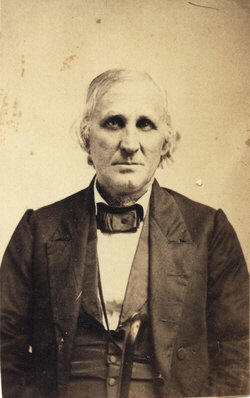

Partner James Henry Hammond
Queer Places:
Quaker Cemetery Camden, Kershaw County, South Carolina, USA, Plot Section 13
 Thomas
Jefferson Withers (1804 – November 7, 1865) was an American politician from
South Carolina who served in the Confederate States Congress during the
American Civil War. Scholar Martin Duberman tells of his long struggle to
unearth the sexually explicit 1826 letters of
James Henry Hammond and
Thomas Jefferson Withers, important conservative figures in the pre–Civil War
South, in the face of massive opposition from the South Caroliniana Library.
The 1826 letters of Thomas Jefferson Withers to James H. Hammond—who both went
on to become southern pro-slavery and states’ rights advocates—reveal a
forthright eroticism that seems at odds with the chaste youthful bed sharing
associated with male romantic friendship. “I feel some inclination to learn
whether you yet sleep in your Shirt-tail,” the twenty-two-year-old Withers
wrote, “and whether you yet have the extravagant delight of poking and
punching a writhing Bedfellow with your long fleshen pole—the exquisite
touches of which I have often had the honor of feeling? . . . Sir, you roughen
the downy Slumbers of your Bedfellow—by such hostile—furious lunges as you are
in the habit of making at him—when he is least prepared for defence against
the crushing force of a Battering Ram.”
Thomas
Jefferson Withers (1804 – November 7, 1865) was an American politician from
South Carolina who served in the Confederate States Congress during the
American Civil War. Scholar Martin Duberman tells of his long struggle to
unearth the sexually explicit 1826 letters of
James Henry Hammond and
Thomas Jefferson Withers, important conservative figures in the pre–Civil War
South, in the face of massive opposition from the South Caroliniana Library.
The 1826 letters of Thomas Jefferson Withers to James H. Hammond—who both went
on to become southern pro-slavery and states’ rights advocates—reveal a
forthright eroticism that seems at odds with the chaste youthful bed sharing
associated with male romantic friendship. “I feel some inclination to learn
whether you yet sleep in your Shirt-tail,” the twenty-two-year-old Withers
wrote, “and whether you yet have the extravagant delight of poking and
punching a writhing Bedfellow with your long fleshen pole—the exquisite
touches of which I have often had the honor of feeling? . . . Sir, you roughen
the downy Slumbers of your Bedfellow—by such hostile—furious lunges as you are
in the habit of making at him—when he is least prepared for defence against
the crushing force of a Battering Ram.”
Withers was born in York County, South Carolina, and served as a state court judge in 1846. He represented the state in the Provisional Confederate Congress in 1861 and signed the Confederate States Constitution. Withers is also notable for the sexually explicit letters he wrote in 1826 to a college friend, future governor James Henry Hammond, with whom Withers had a homosexual relationship. The letters, which are housed among the Hammond Papers at the South Caroliniana Library, were first published by researcher Martin Duberman in 1981, and are remarkable for being rare documentary evidence of same-sex relationships in the antebellum United States.[1]
In 1826 Jeff Withers was studying law at South Carolina College. In 1828 he became editor of the Columbia Telescope, an organ of the powerful nullification movement that had arisen in South Carolina to protest and defy the recent federal tariff. He completed his law studies in 1833. The same year he married Elizabeth Boykin, whose niece, Mary Boykin Chestnut, later won enduring fame for her Civil War journals, published as Diary from Dixie. Elected a common-law judge soon after, Withers later moved up to the state Court of Appeals, where he served until his death in 1866. His moement of greatest public prominence came in 1861, when he was chosen to be one of the fifty delegates sent by the seven seceded states of the lower South to meet in Montgomery, Alabama, there to draw up a provisional goverment for the pending new Confederacy. Withers died at Camden in Kershaw County, South Carolina and was interred at the Quaker Cemetery in the same city.
My published books: